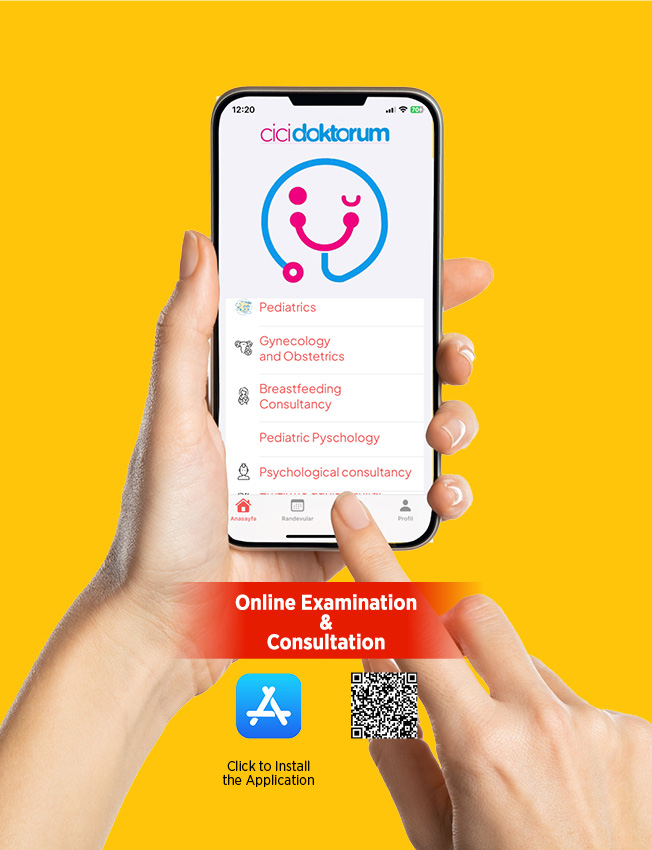Does my child have developmental delay?

Your baby is examined by your pediatrician at certain intervals from birth to be included in a healthy child follow-up program. In this follow-up program, in addition to your baby’s vaccinations, growth, nutrition, and illnesses, mental and motor development are also monitored every month. Some children may lag behind their peers in mental and motor development.
During the periodic pediatrician examination and follow-up, your doctor evaluates your child’s mental and motor development based on the information you provide. However, parents may not notice or even deny and ignore that their child’s development is different from their peers, especially mild to moderate delays in motor and mental development during infancy can sometimes be difficult for doctors to evaluate.
What is developmental delay?
Developmental delay is when a child fails to reach the developmental milestones that should occur at the same time as their peers and falls behind. When evaluating a child’s development, the following developmental milestones are assessed:
Motor skills: Skills such as turning, sitting, crawling, walking.
Language and communication skills: Skills such as recognizing sounds, imitating, babbling, syllabication, and pointing with the hand.
Thinking and reasoning skills: Cause and effect relationship.
Personal and social skills: Exploration, smiling, laughing, communicating with others.
Daily activities: Eating, dressing.
A diagnosis of developmental delay can be made when delays are detected in two or more of these 5 developmental stages. The prevalence of developmental delay in society is estimated to be 1-3%.
TABLE:
SOME DEVELOPMENTAL MILESTONES THAT CAN BE USED IN MONITORING MENTAL MOTOR DEVELOPMENT
| Age Group | Mental Functions | Motor Functions |
| 0-1 month | Looking at face/lightResponse to bell sound | Lifting head while proneEqual movement of 4 extremities |
| 1-3 months | Tracking object/faceResponse to bell soundSmilingCooing | Lifting head to 45°Equal movement of 4 extremities |
| 3-6 months | Audible laughing | Reaching for objectFull head controlSupported sitting |
| 6-9 months | Making babbling soundsTurning to name | Sitting unsupportedRollingTransferring object hand to hand |
| 9-12 months | Non-specific dada-mama wordsWaving bye-bye | Bearing weight on legsStanding with support |
| 12-18 months | Specific mama/dadaFollowing simple commands like give-take | Walking without assistanceImitating household chores |
| 18-24 months | Using more than 3 wordsMaking scribbles on paper | Squatting to pick up from the groundClimbing stairs |
| 24-36 months | Speaking 2-word sentencesAssisting with simple tasks (fetch-bring) | RunningDescending stairs |
| 3-4 years | Speaking in 3-word sentencesNarrating an event | Drawing a 3-6 part personStanding on one foot for 1-3 secondsButtoning clothesDressing oneself |
| 4-6 years | Answering simple questionsExpressing an eventDrawing a simple picture | Standing on one foot for 3-5 secondsButtoning buttonsDressing oneself |
The causes of developmental delay can vary and include genetic disorders, infections, exposure to toxic substances, and complications during birth. Some of the most common causes of developmental delay include:
* Genetic disorders: Chromosomal abnormalities or hereditary diseases can lead to developmental delay. When a mutated gene is passed from parent to child, it can result in a disorder. Fragile X syndrome, Rett syndrome, and other genetic conditions are among the most common.
*Pregnancy complications: High fever or infections during pregnancy can harm the baby’s brain development. Similarly, alcohol and drug use during pregnancy can affect the development of the baby’s nervous system, leading to developmental delay.
*Birth complications: Premature births or hypoxic conditions during delivery, which disrupt oxygenation and circulation, can also cause developmental delay in children.
* Metabolic disorders: Inherited metabolic diseases, thyroid dysfunction, or enzyme deficiencies can result in metabolic problems that lead to developmental delay in children. Conditions such as congenital hypothyroidism, galactosemia, and phenylketonuria (PKU) fall into this category. Screening tests such as newborn blood spot screening and metabolic screening can help diagnose these conditions early.
*Toxins: Exposure to heavy metals like lead can negatively impact the nervous system, resulting in developmental delay and cognitive issues.
* Child neglect: Brain development continues after birth, and parental involvement and stimulating activities play a crucial role in supporting a child’s development. Neglecting a child’s needs or failing to provide adequate stimulation can lead to developmental delays.
Understanding these causes can help healthcare providers identify and address developmental delays early, allowing for interventions and support to help children reach their full potential.
How is the diagnosis of developmental delay made?
When your pediatrician suspects developmental delay while monitoring your baby’s development, they thoroughly review your child’s developmental milestones, past illnesses, and treatments. They may conduct developmental screening tests or refer you to a specialist. These tests may include the Denver Developmental Screening Test, Bayley Screening Test, and Capute (Cat/Clams) scale. Additionally, vision and hearing screenings, genetic and chromosome tests, brain MRI or CT scans, metabolic screening tests, bone age determination, and thyroid function tests may be requested. All tests should not be performed simultaneously. The correct approach is to conduct tests gradually and reassess at each step.
How are children with developmental delay monitored?
Families of children diagnosed with developmental delay often have several questions, such as:
– Why and how did this happen?
– Is it likely to recur?
– What can we expect in the future?
– What are the expected outcomes?
– What can be done to know and prevent this condition in another pregnancy?
To answer these questions, a team consisting of the child’s pediatrician, genetic counselor, pediatric neurologist, child development specialist, and if necessary, child psychiatrist should collaborate to monitor and treat the child. It should be noted that problems, answers, treatment methods, and treatment success vary personally depending on the child and the underlying cause.









